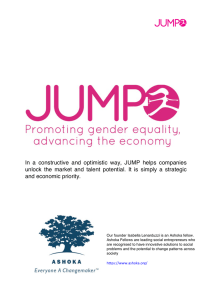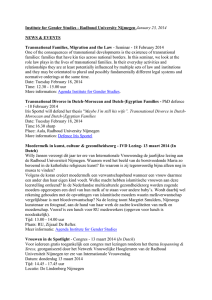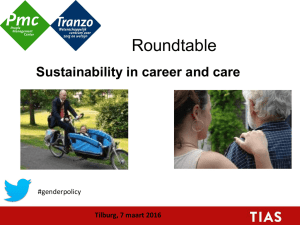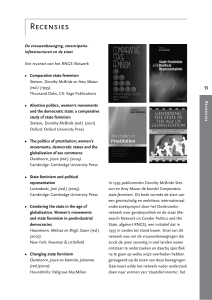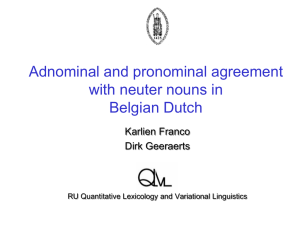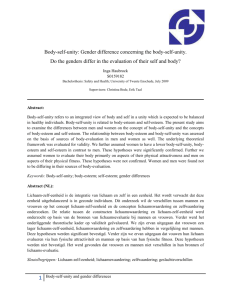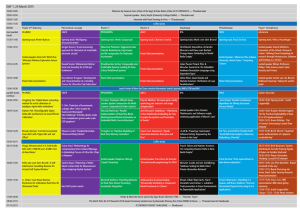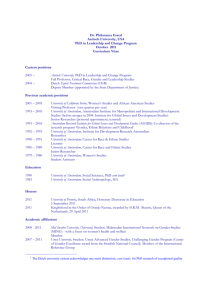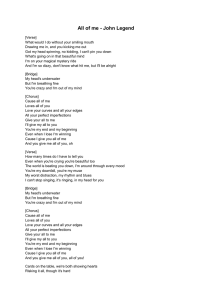Institute for Cultural Inquiry, ICON Faculty of Humanities
advertisement
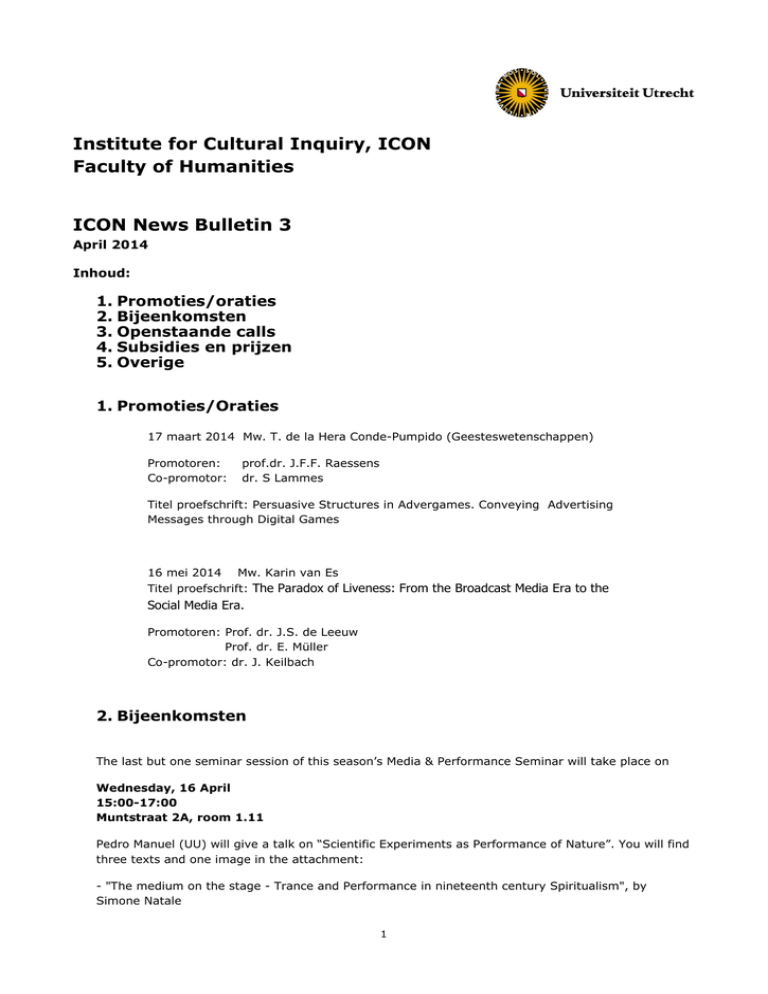
Institute for Cultural Inquiry, ICON Faculty of Humanities ICON News Bulletin 3 April 2014 Inhoud: 1. Promoties/oraties 2. Bijeenkomsten 3. Openstaande calls 4. Subsidies en prijzen 5. Overige 1. Promoties/Oraties 17 maart 2014 Mw. T. de la Hera Conde-Pumpido (Geesteswetenschappen) Promotoren: Co-promotor: prof.dr. J.F.F. Raessens dr. S Lammes Titel proefschrift: Persuasive Structures in Advergames. Conveying Advertising Messages through Digital Games 16 mei 2014 Mw. Karin van Es Titel proefschrift: The Paradox of Liveness: From the Broadcast Media Era to the Social Media Era. Promotoren: Prof. dr. J.S. de Leeuw Prof. dr. E. Müller Co-promotor: dr. J. Keilbach 2. Bijeenkomsten The last but one seminar session of this season’s Media & Performance Seminar will take place on Wednesday, 16 April 15:00-17:00 Muntstraat 2A, room 1.11 Pedro Manuel (UU) will give a talk on “Scientific Experiments as Performance of Nature”. You will find three texts and one image in the attachment: - "The medium on the stage - Trance and Performance in nineteenth century Spiritualism", by Simone Natale 1 - "Nervous Drammaturgy: Pain, Performance and Excess in the work of Dr. Jean-Martin Charcot", by Jonathan Marshall - "Electrical body manipulation as performance art - a historical perspective", by Arthur Elsenaar and Remko Schar - and a picture about Mesmerism found in the internet Also, there is a new Facebookpage on Media & Performance Studies which we invite you to have a look at and which you can “like” if you like. It is not exclusive to the seminar or the Utrecht MA program, but a more general page, set up in Utrecht with the aim to expand. Seminar invitations and other news and events will be posted regularly. See: https://www.facebook.com/mediaandperformancestudies *** Intensive Workshop UU Strategic Theme Institutions of the Open Society “Equality, Inclusion and Its Discontents” Wednesday April 16, 2014 Welcome: 13.30 - 14.00 hrs Start: 14.00 - 17.00 hrs With drinks afterwards Location: Raadzaal, Achter Sint Pieter 200, Utrecht Equality, Inclusion and Its Discontents Although structural social, cultural and economic inequalities obviously exist, we cannot assume to know their inner workings and precise effects. Patterns of in- and exclusion are surprisingly rigid and flexible at the same time. Women and other underprivileged subjects carry the 'sticky signs' (Ahmed 2004: 92), of histories of exclusion and inequality. Throughout the major institutional transformations and crises of several centuries, gender and ethnicity have shown great resilience as categories of in- and exclusion. This necessitates research methodologies which allow for both generalization (social and economic history, statistics, cohort studies, comparative research, economics) and case studies (historical and cross-cultural comparisons, ethnography, affect studies). That is to say, if we want to understand how institutions that are in the middle of transformation work towards social equality and inclusiveness from the perspective of gender and ethnicity we necessarily will have to combine quantitative and qualitative methods. Gender Studies have a long tradition of this type of interdisciplinary research. Core findings include that Gender as it functions in the world today is always connected with race/ethnicity, sexuality, class, generation, etc, and must be considered 'intersectionally' (Crenshaw 1989). Intersectional research therefore has demonstrated how combinations of categories of power difference lead to interference patterns, or “an increase or specification of inequality” (Verloo 2009: 10). Equally crucial is the understanding that – as other patterns of in- and exclusion - gender plays a role on the individual, structural, and symbolic levels of our existence (Scott, 1986). Individual choices, opportunities and restraints should therefore be studied as embedded in both gendered divisions of labour, power, income, agency and gendered social imaginaries, i.e. gendered access to the power of definition. Hierarchical distinctions between public 2 and private spheres have been (and still are) crucial in constituting gendered patterns of inequality. This implies that fundamental research on the role of institutions in the production of equality, inclusion and social mobility should address the way the boundaries between public and private domains work. This is especially urgent at a moment in time when transformation of institutions seem to result in blurring of these boundaries. Tasks that were previously performed by the state (welfare provision, social services, mental health care, education, security) become the responsibility of individuals (home care), are allocated to private commercial enterprises (for instance school entrance trainings, security firms) or hired help (nannies, cleaning, care for elderly). At the same time, the call for government-steered forms of control, intervention, and prevention increases also, and intrusions of privacy are no longer considered by many as problematic but perhaps even as desirable (Van den Berg and Duyvendak 2012). How can we study the interaction between such institutional transformations and the hierarchical dichotomies between masculinity and femininity, autochtonous and non-autochtonous, Western and non-Western? The central question which will be addressed in the Intensive Workshop is: What happens when new institutional, cultural and social practices challenge and redefine distinctions between public and private? How do the struggles for new institutional forms interact with patterns of in and exclusion along lines of gender and ethnicity? The steering group of the IOS pillar Equality, Inclusion and Social mobility (EIS) has invited three UU scholars to present their interdisciplinary and jointly executed research plans as well as intended research proposals to the wider Institutions community. UU and other researchers are cordially invited to join this intensive workshop in order to get an insight in the way in which multidisciplinary analysis is deployed within the Humanities, Anthropology and Law studies in order to analyse processes of in- and exclusion at the intersections of public and private domains. Additionally, participants are invited to discuss the proposed projects and possibly become partner in one of the envisioned research applications to be submitted and/or conferences to be organized. Speakers and referents include Dr. Susanne Burri (Law, UU), Dr. Marieke van Eijk (Gender Studies, UU), Dr. Deen Freelon (Political Communication, American University, Washington), Dr. Mirko Schäfer (Mediastudies, UU), Prof. dr. Berteke Waaldijk (Gender Studies, UU). The afternoon will be chaired by Prof. dr. Rosemarie Buikema (Gender Studies, member of the steering group EIS). Please register with Linda Westerink before April 14: a.h.westerink@uu.nl *** 3 FESTIVE LUNCH LAUNCH FOCUS AREA Cultures, Citizenship, and Human Rights (CCHR) Tuesday 27 May 2014 12:00h - 14:30h Raadzaal, Achter Sint Pieter 200, Utrecht Cultures, Citizenship, and Human Rights is a new focus area of Utrecht University that conducts research on the cultural factors that shape citizenship in Europe today. Citizenship is established in a public arena where law and culture interact, where divergent values encounter each other, and culture influences the way in which processes of in- and exclusion as well as human rights are constituted both locally and globally, in Europe as well as elsewhere in the world. Who belongs where, who is protected by the law and whose voice counts are issues subject to renegotiation and redefinition. More insight into the convergence and tensions among the cultural, political, and legal foundations of citizenship is therefore vital to a better understanding of inclusive and resilient societies. Cultures, Citizenship, and Human Rights kicks off in May 2014 as a research initiative of the faculties of the Humanities (GW), Law and Governance (REBO), and the Social Sciences (FSW). The members of the participating research programmes develop interdisciplinary projects at the intersection of three research lines: Mediation, Sovereignty, and Contestation. The programme will be directed by Rosemarie Buikema (GW), Antoine Buyse (REBO), Ton Robben (FSW). The afternoon will be dedicated to the introduction of the research goals and funding possibilities of the programme. The three leading will briefly introduce ongoing and future research projects. Project of the participating research programmes will announce new initiatives and projects to be jointly developed in the context of research focus area CCHR. Lunch will be provided. lines, the members members research this new Thus we welcome you all to meet on Tuesday May 27 and to get to know fellow researchers working on similar themes and to intensify existing research collaboration! Details on the programme will follow soon. Please register before May 20, 2014: cchr@uu.nl *** 4 Discussieavond ‘Geschiedenis & Games’ door de Vereniging Geschiedenis, Beeld en Geluid Datum: 14 april 2014 Inloop: 19:30 Aanvang: 20:00 Locatie: IJsfontein, Haarlemmerweg 4, Amsterdam (aan het Westerpark) Toegang gratis Steeds vaker is de geschiedenis bron voor spellenmakers. Commerciële gamestudios brengen de recente geschiedenis van de Tweede Wereldoorlog (Call of Duty)of het Florence van de Medici en de Renaissance (Assassin's Creed) tot leven. En ook in serious games komt de geschiedenis vaak naar voren. Bijvoorbeeld de recente geschiedenis van de Tweede Wereldoorlog, zoals in de aan het gelijknamige NPSprogramma verbonden game 13 in de oorlog, ontwikkeld door IJsfontein. Maar ook de geschiedenis buiten het bereik van het 'collectieve geheugen', bijvoorbeeld in de onlangs gelanceerde app Het spel van de Gouden Eeuw, ontwikkeld door de gamedesigners van Monkeybizniz. Tijdens de discussie-avond 'Geschiedenis & Games' gaan gamedesigners Jan Willem Huisman (IJsfontein) en Dimme van der Hout (Monkeybizniz) en universitair docent nieuwe media en digitale cultuur René Glas (Universiteit Utrecht ) met elkaar en het publiek in gesprek over dit onderwerp. Put je als gamedesigner inspiratie uit concrete archiefbeelden van een periode of gebeurtenis, als die er zijn? En hoe geef je de geschiedenis weer als er weinig of geen beeld is van een tijd? Hoe komt dan de verbeelding van die geschiedenis tot stand? Moet je dicht bij een historische waarheid blijven, of kun je die loslaten? Hoe ga je om met het collectieve beeld dat van een bepaalde tijd bestaat? U bent als GBG-lid van harte uitgenodigd voor deze discussie-avond. En stuur deze uitnodiging graag ook door naar mogelijke andere geïnteresseerden! *** 5 Next PhD/Postdoc meeting: 12 juni 16.00 – 17.30 hrs Agenda and location to be announced Hooglerarenoverleg: 12 juni 15.00 – 16.00 hrs Agenda and location to be announced *** 3. Openstaande calls Aspasia Diversiteitsgelden Vrouwelijke onderzoekers (m.u.v. hoogleraren) binnen de faculteit Geesteswetenschappen kunnen een aanvraag indienen om hun onderzoeksprofiel te versterken. In de bijlage vinden jullie meer informatie. Voor onderzoekers die behoren bij het onderzoekinstituut ICON geldt het volgende: Als je een aanvraag wilt indienen zorg er dan voor dat je vooraf toestemming hebt van jouw leerstoelhouder (o.a. ivm eventuele onderwijsvervanging) en dat het departementshoofd en de onderzoekdirecteur ICON zijn geïnformeerd. Deadline voor indiening (bij Fleur de Haas) is 1 mei. De procedure voor aanvraag is als volgt: Aspasia heeft als doel het bevorderen van vrouwelijke wetenschappers tot universitair hoofddocent (of hoogleraar). Aspasia is verbonden aan de NWO Vidi- en Vici-competitie. Voorwaarde van Aspasia is dat een deel van de premie besteed moet worden aan bredere activiteiten die de doorstroming van vrouwen aan hun instelling bevorderen; daarvan is deze call een onderdeel. Vrouwelijke onderzoekers (m.u.v. hoogleraren) binnen de faculteit Geesteswetenschappen kunnen een aanvraag indienen om hun onderzoeksprofiel te versterken. In deze ronde is er € 60.000 beschikbaar. Per aanvraag wordt maximaal € 6.000 uitgekeerd (voor het schrijven van een Veni-voorstel wordt maximaal € 3.000 uitgekeerd) • • • • Vrouwelijke onderzoekers kunnen een aanvraag doen voor o.a.: vrijstelling van onderwijstijd om een onderzoeksaanvraag te kunnen schrijven. een buitenlandverblijf een coachingstraject organiseren van een workshop Voorwaarden voor de aanvraag: • • • • de aanvraag is beknopt (maximaal 1 A-4tje) de aanvraag gaat vergezeld van een CV de aanvraag is goedgekeurd door de onderzoeksdirecteur de begroting is goedgekeurd door de coordinator bedrijfsvoering van het betreffende onderzoeksinstituut; 6 • • • • • Voor vrijstelling van onderwijstijd en/of een buitenlandverblijf hebben de onderwijsdirecteur en het departementshoofd toestemming gegeven. Let op: Ook promovendi die hun proefschrift bijna hebben afgerond mogen een aanvraag indienen van maximaal € 3000 met als doel het schrijven van een onderzoeksvoorstel. Het maakt voor de aanvraagprocedure niet uit of de onderzoeker al reeds eerder een Aspasiasubsidie toegekend heeft gekregen. Onderwijsvervanging kan aangevraagd op het niveau van de eigen salariskosten tot een maximum van schaal 11/11. Bij 11/11 kan vanwege de 6000 EURO grens als maximale vervanging niet meer dan 0.08 aangevraagd worden (= ongeveer 1 standaard bachelorcursus met 30 inschrijvers). Bij lagere salarislasten kan, zo lang het binnen de 6000 EURO grens blijft, max. 0.1 aangevraagd worden. De gelden mogen in 2014 en 2015 besteed worden. Procedure: • Deadline voor indiening is 1 mei. Aanvragen kunnen per e-mail ingediend worden bij Fleur de Haas, f.dehaas@uu.nl • De uitslag over de toekenningen zal eind mei medegedeeld worden. Na afloop van de besteding van de gelden dient er een verslag (1 A4) ingediend worden met een beschrijving en een financiële afrekening. *** The Creating and Researching Absorption in Stories Conference (CRASC) aims to provide researchers and creators with an opportunity to discuss their mutual interests in the absorbing power of stories. We are pleased to announce the Creating and Researching Absorption in Stories Conference, to be held at the University of Amsterdam (The Netherlands) from the 16th to the 18th of July 2014. We send you this call for poster proposals to invite you to present your research results, ideas or absorbing narratives in the form of a poster during the conference. Presenting a poster is a great opportunity to effectively induce a dynamic conversation and obtain interesting and valuable feedback on your research or artwork. The conference committee welcomes proposals for posters on absorption in various narrative art forms, such as literature, film, games, music. But proposals on other ways of storytelling designed to absorb their audience (e.g. trans-medial storytelling) are also more than welcome. We especially encourage people from the creative industries who are interested in collaboration with scientific partners on projects investigating absorbing story telling to apply. Abstracts of poster proposals are invited for submission. Abstracts should include: the title of the poster; a list of five keywords, the research question(s); approach, methodology and results. The abstract should be no more than 250 words, excluding bibliographical references. Please also include the following information: the name(s) of the author(s) and their affiliation(s), and the author’s e-mail address. Abstracts must be received by 2 May 2014. The authors will be notified of acceptance by 15 May 2014 by e-mail. Please send your abstracts in a PDF form to: Katalin Bálint, k.e.balint@uu.nl Further information on the program and guidelines on poster design will be found at http://blog.hum.uu.nl/storycenter Frank Hakemulder, Ed S. Tan, Moniek Kuijpers, Miruna Doicaru and Katalin Bálint 7 4. Subsidies en prijzen Leo Lousberg is the winner of the Utrecht History Award 2014. The prize was given for his essay "Utrecht's Vanished Musical Heritage: A Twelfth-Century Antiphonary" ( ‘Verklonken Utrechts erfgoed: een twaalfde-eeuws antifonarium)’ which discusses the remnants of a liturgical book containing chants once sung at the former abbey of St Paul's in Utrecht. The music fragments are now kept at the Special Collections of Utrecht University Library. Lousberg graduated cum laude from the Research MA programmes in Musicology and in Medieval Studies in 2013, making him the first student ever to take both degrees simultaneously. He developed his prize-winning essay out of his Research MA thesis "EarlyTwelfth-Century Utrecht Responsories: A Quest for Musical Style Elements". The Utrecht History Prize is awarded biannually by the Vereniging Oud-Utrecht and is intended to stimulate new original research on the history of Utrecht province. The prize includes a monetary award of EUR 2,500 as well as a plaque designed by Theo van de Vathorst and will be handed out at the Utrechts Archief, Hamburgerstraat, on 4 June 2014. The prize-winning essay will appear in print in the 2014 issue of Jaarboek Oud-Utrecht, published by the Vereniging. 5. Overige EU LLP EDGES, Joint European PhD in Gender and Women’s Studies The Graduate Gender Programme of Utrecht University is a leading member of the EU LLP EDGES (2013-2015). EDGES is a Lifelong Learning Programme Project coordinated by the University of Bologna that involves eight academic and non-academic European institutions (University of Bologna, Italy; Central European University, Hungary; University of Granada, Spain; University of Oviedo, Spain; University of Hull, UK; University of Lodz, Poland; University of Utrecht, The Netherlands; and Associazione Orlando, Italy) which have a longstanding experience in Women’s and Gender Studies. EDGES aims to shape and develop a model for a European PhD in Women’s and Gender Studies which focuses on the comparison and integration between different geographical, historical, and socio-political contexts thanks to the collaboration and synergy among universities that have different histories, experiences and expertise in the field of European Feminism and Gender Studies. EDGES will trigger an interdisciplinary and intercultural approach to highlight crucial issues such as women’s migration, violence on and exploitation of women’s body, traumatic experiences in recent conflict areas, cultural and counter-memories, equal opportunities in education, careers and job market, discrimination in sexual orientation, civil rights and religious prejudices. EDGES will favour a vital change in the preparation of the next generation of academic, business, public and third sector European leaders. The Graduate Gender Programme is leader of the workpackage that designs and develops the international doctoral curriculum on Women's and Gender Studies. More information: http://www.edgesproject.eu/ 8 *** Nicole Immler, de afgelopen jaren als affiliated researcher verbonden aan het OGC (focusgroep Cultures and Identities), is sinds 1 maart jl., mede op basis van een Aspasia (NWO), vast verbonden aan de Universiteit van Humanistiek in Utrecht als docentonderzoeker geschiedenis, in het bijzonder rechtsherstel en herinneringscultuur. Daarnaast zal zij in het kader van een Marie Curie Fellowship (EU) vanaf mei voor 2 jaar aan het NIOD werken op het thema ‚Narrated (In)Justice’ binnen het onderzoeksprogramma ‚Understanding the Age of Transitional Justice: Narratives in a Historical Perspective’. 9
